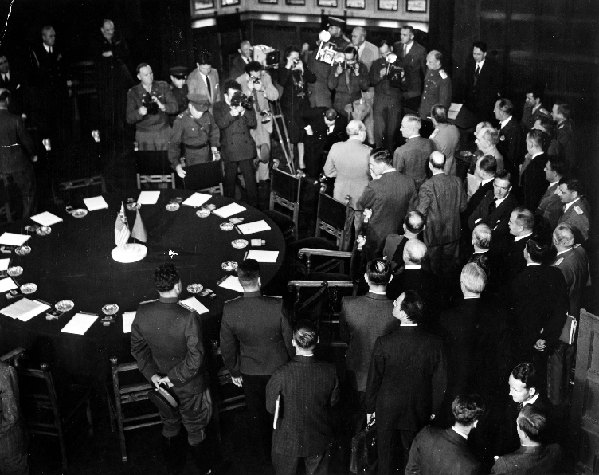70 years after the Potsdam Declaration
- By Heiko Khoo
 0 Comment(s)
0 Comment(s) Print
Print E-mail China.org.cn, July 26, 2015
E-mail China.org.cn, July 26, 2015
|
|
|
Crowded meeting room at the Potsdam Conference [File Photo] |
Seventy years ago, on July 26, 1945, the United States, China and Britain issued the Potsdam Declaration, which set the terms of Japanese surrender at the end of World War II. It warned Japan of the imminent and total destruction of their country if the terms of capitulation were not accepted. It explained the need to oust Japan's "self-willed militaristic advisers" and demanded the permanent eradication of "the authority and influence of those who have deceived and misled the people of Japan into embarking on world conquest." It required unconditional surrender and explained that Japan would be occupied, de-militarized and purged of "all war criminals."
Japan's military and the state leaders had no more respect for the people of Japan, than they had for the people of the nations that they had occupied, tortured and massacred, in China and Southeast Asia. As it happened, Japan's leaders were unwilling to contemplate defeat and surrender, and consequently, this strongly worded threat to Japan was followed by the U.S. dropping two atomic bombs on Japan, in Hiroshima and Nagasaki, inflicting massive civilian causalities. As previously agreed with the western allies, the Soviet Union entered the war against Japan on August 9, three months after defeating Germany.
It is widely accepted that the origins of the Cold War in Asia can be traced to this period. The use of the atomic bomb served less to destroy Japanese power than to display U.S. power -- as the Japanese armed forces were already severely weakened and its people were destitute. The Soviet military launched a powerful offensive to defeat the Japanese in the occupied Chinese territory of Manchuria. This, combined with the impact of U.S. atomic bombs, led Emperor Hirohito to surrender.
However, fear of the Soviet advance in the East Asia, following as it did the Soviet victory over German fascism in Berlin; created a shift in the U.S. attitude towards Japan. Anti-communism replaced anti-fascism as the primary objective of U.S. policy, and this also defined the actions of the Chinese nationalist leader, Chiang Kai-shek. He had regarded China's communists led by Mao Zedong as his primary enemy since the 1927.







Go to Forum >>0 Comment(s)